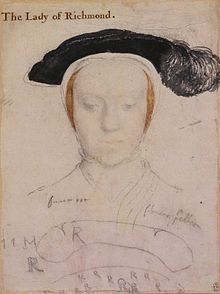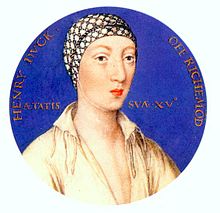Mary FitzRoy, Duchess of Richmond and Somerset

Mary FitzRoy, Duchess of Richmond and Somerset (c. 1519 – 7 December 1557), born Mary Howard, was a daughter-in-law of King Henry VIII of England, being the wife of his illegitimate son Henry FitzRoy, 1st Duke of Richmond and Somerset.
Biography[edit]
This section needs additional citations for verification. (December 2022) |

Mary was born in 1519, being the second of three children of Thomas Howard, then Earl of Surrey, by his second wife, Elizabeth Stafford. At the time of her birth, her father was the third-highest-ranking and most powerful nobleman in England. Her grandfathers, Thomas Howard, 2nd Duke of Norfolk and Edward Stafford, 3rd Duke of Buckingham were the most powerful peers in the Kingdom. After Buckingham's execution for treason in 1521, her grandfather was one of only two dukes in the Kingdom, (the other being Charles Brandon, 1st Duke of Suffolk). When his paternal grandfather died in May 1524, Mary's father became the new Duke of Norfolk. This changed in 1525, when Henry VIII elevated Henry FitzRoy, his six-year-old illegitimate son by Elizabeth Blount, to the Dukedom of Richmond and Somerset. When in 1529 Cardinal Wolsey, who was charged with FitzRoy's care, fell from grace the mantle passed to Thomas Howard. At the same time the idea arose, allegedly from either the King or Anne Boleyn,[1] that FitzRoy should marry Norfolk's daughter.
Four years later, in November 1533, negotiations were completed and Mary, now aged thirteen or fourteen, and FitzRoy, himself just fourteen, were married. Through her father, she was first cousin to both Anne Boleyn and Catherine Howard, as well as second cousin to Jane Seymour.

The match was a triumph for the Boleyn family as the Duchess was a former member of Queen Anne's household, and a staunch advocate of reform. It was also a very advantageous match for the Duchess as with no legitimate male heir to the throne, the Duke was seen at the time as a likely future king. However, the marriage was not to last as FitzRoy died of consumption on 23 July 1536. He had barely turned seventeen.
Fearful that sexual activity too early was unhealthy, the King had ordered the couple not to consummate their marriage.[citation needed] As a result, the Duchess was not allowed to keep many of the lands which would normally have been her entitlement as widow: the King insisted without the consummation,[citation needed] it was not a true marriage. She remained at court, closely associated with FitzRoy's cousin, Margaret Douglas. Together they were the main contributors to the Devonshire Manuscript, a collection of poetry from themselves and court poets.[2] The Duchess is thought to be the owner or holder of the manuscript; it is not known how much she contributed, however she is thought to have copied in one of her brother's poems "O Happy Dames."[3] In 1539, Douglas and the Duchess were appointed to meet Anne of Cleves at Calais.[4]
In 1542, when Henry VIII's fifth wife and the Duchess's first cousin Catherine Howard fell from grace, the Duchess and her entire family were arrested and briefly imprisoned in the Tower of London. The Duchess's father petitioned for her to be married to Thomas Seymour, brother of Henry VIII's third wife Jane Seymour. [1] The King gave his approval for the match, but her brother, Henry, Earl of Surrey, objected strongly, as did the Duchess herself; and the marriage did not take place. Surrey then suggested that the Duchess should seduce the aged King, her father-in-law, and become his mistress, to "wield as much influence on him as Madame d'Etampes doth about the French King". The Duchess, outraged, said she would "cut her own throat" rather than "consent to such villainy".[5] She and her brother fell out, and she later laid testimony against Surrey that helped lead to his trial and execution for treason in January 1547. Sympathetic to the Reformation, she engaged John Foxe as tutor for her brother's children.

The Duchess never remarried and her presence at court dwindled not long after Henry VIII died in January 1547. She died in December 1557, during the reign of her sister-in-law, Queen Mary I.
Further reading[edit]
- Beverley A. Murphy's Bastard Prince: Henry VIII's Lost Son
- Kelly Hart's The Mistresses of Henry VIII
- Henry VIII's Last Victim: The Life and Times of Henry Howard, Earl of Surrey by Jessie Childs
- Henry Howard, the Poet Earl of Surrey: A Life by W.A. Sessions
Fictional portrayals[edit]
Though the Duchess has not been portrayed in any film or television programme thus far, she was mentioned in the second episode of the 2021 miniseries Anne Boleyn in a scene between Anne and her uncle Thomas Howard where they discuss his daughter's marriage to Henry FitzRoy that has not yet been consummated.
She has appeared in many books of noted historical fiction, most notably The Secrets of the Tudor Court by Darcey Bonnette which features Mary as the main character, and The Sixth Wife, in which she is a rival of Catherine Parr, and is used by her brother Surrey to try to become a "seventh wife" of the King despite her protests. Her character mainly falls into the background toward the end of the novel after the king has died. She is also featured in Queen's Gambit, a novel about Catherine Parr and is featured as one of Catherine's rivals. Mary was also the main character and story-teller in Brazen by Katherine Longshore.
References[edit]
- ^ a b Murphy, Beverley A. (3 January 2008). "Fitzroy (nee Howard), Mary, Duchess of Richmond". Oxford Dictionary of National Biography (online ed.). Oxford University Press. doi:10.1093/ref:odnb/9638. Retrieved 28 August 2020. (Subscription or UK public library membership required.)
- ^ Herman, Peter C. (1994). Rethinking the Henrician Era: Essays on Early Tudor Texts and Contexts. University of Illinois Press. p. 43. ISBN 978-0-252-06340-4.
- ^ Southall, Raymond (1994). "Mary Fitzroy and 'O Happy Dames' in the Devonshire Manuscript". The Review of English Studies. 45 (179): 316–317. doi:10.1093/res/XLV.179.316. ISSN 0034-6551. JSTOR 518839.
- ^ Nichols, John Gough, ed., The Chronicle of Calais, Camden Society (1846), 170
- ^ Hart, Kelly (1 June 2009). The Mistresses of Henry VIII (First ed.). The History Press. pp. 194–197. ISBN 978-0-7524-4835-0.
External links[edit]
- A portrait of the Duchess titled "Lady of Richmond" was sketched by Hans Holbein


